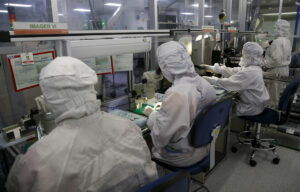
Manufacturing hub status seen as critical to Philippine investment competitiveness
THE Department of Trade and Industry (DTI) said structural changes to the economy are needed to attract more foreign investment, with the Philippines needing to become a manufacturing hub for certain industries to do so.
“What this means is that we will be completely aligned with the eight-point socioeconomic agenda,” Trade Undersecretary Maria Blanca Kim Bernardo-Lokin said in a televised interview on Tuesday.
“When you say structural changes, we need really big changes to happen and for this it would mean placing ourselves more aggressively to become the next manufacturing hub of certain industries,” she added.
She said the prerequisites for achieving this are upskilling the workforce and investing more on digitalization.
“For the part of our investment promotion agencies (IPAs), they are also preparing by strengthening investment strategies and the ease of doing business,” she said.
“IPAs follow Executive Order (EO) 18 and what we are trying to do now is strengthening it; so far, a lot of investments are being endorsed,” she added.
According to Ernie Delos Reyes, director for IAS and One-Stop Action Center for Strategic Investments, the Board of Investments has around P930 billion worth of green-lane projects for possible registration.
These include certified green-lane projects worth P370 billion, P360 billion worth of projects which are still under evaluation, and incoming applications worth P200 billion.
The green lanes for strategic investments were established through EO 18, which aims to expedite, simplify, and automate the permit and license application processes for strategic investments.
In separate statements, the DTI and Philippine Economic Zone Authority (PEZA) welcomed the appointment of Secretary Frederick D. Go, saying that his newly created office will boost investment promotion.
“Executive Order 49 is a welcome boost that consolidates all the efforts of IPAs for a whole of government approach in acquiring investments, converting commitments to actual operations, and promoting the country as the prime investment hub in the region,” PEZA Director General Tereso O. Panga told BusinessWorld via Viber message.
“As such, we recognize the Office of the Special Assistant to the President for Investment and Economic Affairs’ (OSAPIEA) primary mandate to ensure effective integration, coordination and implementation of the various investment and economic policies and programs of the government,” he added.
In December, President Ferdinand R. Marcos, Jr. signed EO 49, which created OSAPIEA. The President also appointed former Robinsons Land Corp. president Frederick D. Go as the head of the OSAPIEA, granting him Cabinet-level rank and the chairmanship of the Economic Development Group.
“In all his functions, Sec. Go can expect full support from PEZA as we share the same vision of bringing in more foreign direct investment. We look forward to a strong partnership between OSAPIEA and PEZA as we continue to advance the ecozone agenda,” Mr. Panga said.
Trade Secretary Alfredo E. Pascual said an official with coordinating powers brings the Philippines in line with the practice in other countries.
“I think, in a way, it is helpful that somebody is coordinating because even other countries have coordinating ministers,” Mr. Pascual said.
“It is a welcome move especially that it will help expedite for example the processing of the entry of foreign investors, because one of our big problems is the ease of doing business,” Mr. Pascual said.
He said Mr. Go will have enough power to compel local government units and national agencies to expedite the entry of foreign investment. — Justine Irish D. Tabile



